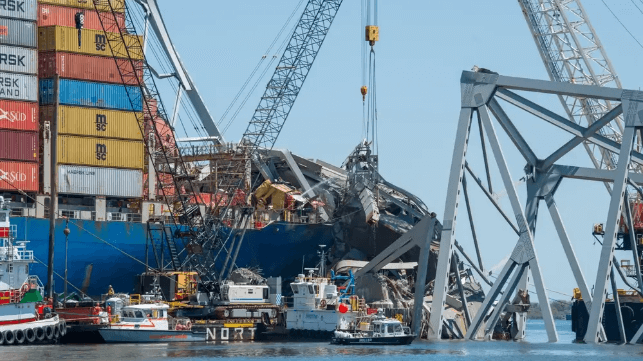PDQ
Salvors May Remove Baltimore Container Ship in Less Than Two Weeks

On Tuesday, Maryland's governor said that responders at the site of Baltimore's Key Bridge are making progress on clearing the shipping channel and freeing the container ship Dali, which struck a pier and collapsed the structure in seconds on March 26. Officials think that the boxship could be removed by May 10, according to a statement from the Port of Baltimore.
Since the cleanup began in earnest, responders have pulled more than 3,300 tons of steel out of the channel, including several 300-500 ton sections of the main span. The East Coast's largest floating crane is on scene to handle these gigantic lifts, and the unified command is moving at a deliberate pace to ensure safety.
One of the hardest lifts, the section that is trapping the container ship Dali, is next up on the list. The temporary shipping channel next to Dali will be closed for the next 10 days as salvors prepare to pull this twisted segment off the ship's bow. The contractors will make a series of precise cuts all at once to remove the section without collapsing it further, Rear Adm. Shannon Gilreath said at a press conference.
Meanwhile, contractors are using a massive 1,000-ton hydraulic claw to grab tangled piles of steel girders off the bottom, without the risk of sending down divers to rig every lift.
When the channel reopens on May 10, the unified command believes that it will have a control depth of 45 feet - nearly as deep as it was before the accident. The previous "limited access channel" was deep enough to move ro/ros and one sub-Panamax boxship, but 45 feet should be enough to begin moving larger container ships in and out of the port - with a two-tug escort. The timeline is still subject to the uncertainties of salvage work.
"There's a lot of factors that play in to that, both the engineering, the salvage operations themselves, and weather," said Rear Adm. Gilreath. "We're going to continue to move to do this safely and as fast as possible."
While the operation in the main ship channel is under way, three temporary shallow channels will remain open for tug and barge traffic. Full 50-foot channel restoration is still expected by the end of May.
The bodies of two construction workers who were lost in the bridge collapse are still missing, and the Maryland State Police hopes that it will be possible to find them to bring closure to their loved ones. Four deceased workers have been recovered to date, but wreckage and zero-visibility conditions on the river bottom have made dive operations challenging. Police divers have "areas of interest" within the debris field, and are on standby for opportunities to access these sites.
Maryland is still seeking the support of Congress to fund the eventual reconstruction of the Key Bridge, a project which will likely take several years and several billion dollars. Gov. Wes Moore said that multiple members of Congress have come to see the site, and he expects the chairman of the House Appropriations Committee to visit soon. In addition to rebuilding the Key Bridge, Maryland's transportation department is also considering upgrades to protect the giant Chesapeake Bay Bridge, another older bridge that lacks heavy protective structures.
No comments:
Post a Comment